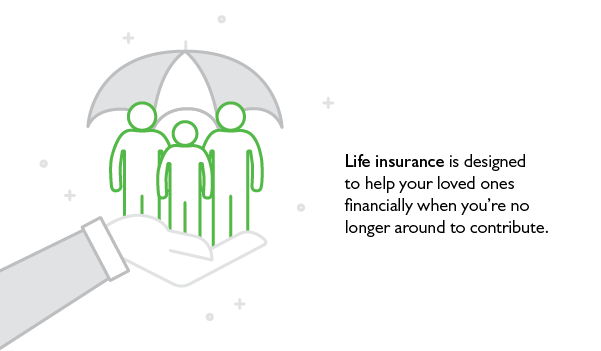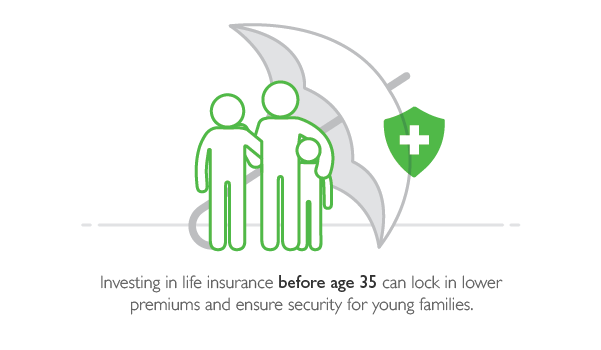Securities and insurance products are not deposits, not FDIC insured, not insured by any federal government agency, not guaranteed by the bank, and may go down in value.
What Is the Purpose of Life Insurance?
Life insurance might seem like a daunting topic filled with confusing terms and concepts. However, its significance in ensuring your family’s financial security and financial protection cannot be overstated. By purchasing life insurance, you help protect your loved ones in the event of your untimely passing, providing a financial cushion that can cover final expenses, replace income and safeguard your family’s quality of life.
Just as you wouldn’t neglect home or auto insurance, life insurance is crucial for protecting your loved ones from financial hardship. Buying life insurance helps make sure that your family — often the beneficiary of a death benefit — has the means to cover debts, maintain their lifestyle and achieve long-term financial goals like higher education. This is especially important if your goal is to protect family members from burdens such as mortgage payments or estate taxes, which can be part of effective estate planning.

How Life Insurance Works: A Simple Explanation
Life insurance policies help your loved ones financially when you’re no longer around. At its core, life insurance is a contract between you and an insurance company. You pay regular life insurance premiums — sometimes referred to simply as insurance premiums — and in return, the insurer agrees to pay a death benefit to your beneficiaries upon your passing. This death benefit can help your family cover immediate expenses such as funeral costs, as well as ongoing financial obligations like mortgage payments or daily living expenses.
Essentially, life insurance provides a financial safety net to ensure that your family is taken care of when you are no longer around to do so. In many cases, the death benefit paid to your beneficiaries can also provide funds toward bigger financial goals or assist with tax-deferred strategies. Furthermore, some forms of insurance riders may expand the policy’s coverage, offering additional benefits life insurance can provide.
Who needs to have life insurance?
Life insurance is right for almost everyone, even if you’re young. People in their 20s, 30s, and even 40s often overlook insurance financial decisions like buying life insurance because it requires addressing an uncomfortable question about mortality. In many cases, these individuals also assume a policy simply isn’t right for them given their age or family situations.
Opening a policy when you’re young and healthy could be a smart choice. You’re likely to get the best rates and terms, as life insurance premiums will be more expensive as you age. The longer you wait to open a policy, the more risk you face that an unexpected event could leave your family without coverage or financial help. Purchasing life insurance early is one of the best ways to ensure your loved ones have sufficient financial protection if something should happen.

Which type of life insurance may be best for you?
Depending on where you’re at in your life, it’s important to know exactly which type of life insurance is best for you or if you need any at all. Different options include:
TERM LIFE INSURANCE
Term insurance, sometimes simply called a term policy, has an expiration date. These terms often last 10, 15, 20, 25 or 30 years. This policy covers your family from when you take it out to the end of your set term. Younger individuals and families often opt for term life insurance. This is because they need more immediate protection and their future needs are less certain.
Many try to match their policies with financial obligations or goals. For example, a homeowner with 25 years remaining on their mortgage might take out a policy of the same length, helping protect family members from financial risks if the policyholder passes away before paying off the mortgage.
Or let’s say you’re 30 and plan to have kids soon. In that case, signing up for a 30-year policy would lock in your insurance premiums for the next 30 years. At 59, you would be paying the same amount per month as you did at age 30.
The tradeoff is that the starting premium for a 30-year policy tends to be higher than, say, a 10-year policy — precisely because you’re locked in. You also don’t know how much your life circumstances will change in 20 or 30 years, what types of life insurance needs you’ll have, what new expenses you’ll incur, your income, inheritance and more. In the long run, though, a 30-year term will usually be cheaper than three consecutive 10-year terms, and it offers consistent financial planning over a longer duration.
WHOLE LIFE INSURANCE
Like term life insurance, whole life policies provide a death benefit and other benefits that we’ll get into later. But they have a key difference: A whole life policy never expires. In many cases, whole life is also referred to as permanent life insurance. The main advantage of whole life is that it builds cash value — sometimes referred to as cash life insurance. A portion of each premium payment you make is put away in a different account that you can invest or access through a loan.
UNIVERSAL LIFE INSURANCE
A universal life policy is another form of permanent life insurance. The difference is that it gives the policy owner much more flexibility in terms of their premiums and cash value. Whereas a term or whole life policy locks in your rate, a universal policy allows you to pay what you’re able to or want to with each premium. It also allows you to adjust your death benefit during the policy, which can’t be done with other types of life insurance.
Signing up for a life insurance policy (whole or term) sooner rather than later can help you lock in lower premiums. If you have dependents, such as children, a spouse, or parents you’re caring for – and lack significant wealth – it may be in your best interest to purchase a policy even if you are relatively young.
Should anything happen to you, you have the peace of mind knowing you’ll leave your loved ones with the financial means to settle any remaining expenses, cover funeral costs and potentially use the proceeds for retirement income or other long-term needs. Life insurance benefits can also assist your family members if they need help with large debts or in replacing income.
Are there more benefits in a life insurance policy besides a death benefit?
Many life insurance policies offer riders and other perks along with a death benefit. Riders are optional adjustments that you can make to your policy to increase your coverage and fit your needs. Common riders include:
- Accidental death and dismemberment. This rider extends your coverage and can provide for your family in the event of an accident that leads to a disability or death (i.e., an accident involving public transportation).
- Long-term care. If a policy owner needs funds to cover long-term care expenses, this rider, when activated, will provide monthly payments to cover those costs.
- Premium waiver. This rider can waive premiums after that event so coverage is not lost if the policy owner cannot pay the monthly costs of their policy.
A life insurance policy can open doors to other benefits and savings, too. Many life insurance companies will give policyholders discounts on health and wellness products and services, like gym memberships. You can research different providers to find the best offer for you.
When Should You Get Life Insurance?
The best time to get life insurance is when you have financial responsibilities and people who depend on your income. This includes having a spouse, children, aging parents, or any other dependents. Additionally, if you have significant debts like a mortgage, student loans, or business loans, life insurance ensures that these obligations do not become a burden on your family.
How Much Life Insurance Coverage Do You Need?
Determining the right amount of life insurance coverage depends on your specific financial needs and obligations. Here are two common methods to calculate your coverage:
Income Multiplier Method
A straightforward approach is to multiply your annual income by 10. For example, if you earn $90,000 per year, you would need $900,000 in coverage. This method provides a rough estimate and should be adjusted based on your unique circumstances.
DIME Method
This method provides a more detailed calculation by considering four main factors:
- Debt: Total personal debts, including credit card balances, business loans, car loans, and student loans.
- Income: Your annual income multiplied by the number of years your family would need financial support.
- Mortgage: The outstanding balance on your mortgage and property taxes.
- Education: The cost of college for each of your children.
By adding these amounts together, you can determine a more accurate estimate of your life insurance needs. This approach also helps ensure your family remains stable without financial strain, covering final expenses and other critical costs if you pass away.
Benefits of Securing Life Insurance at a Young Age
Getting life insurance at a young age is beneficial because premiums are generally lower when you are young and healthy. Waiting until you are older or have health issues can result in higher premiums or even make you uninsurable. Therefore, it’s wise to secure a policy as soon as you have financial responsibilities and want to protect family members effectively.
Young policyholders also benefit from the peace of mind that comes with knowing their loved ones are protected. Even if you do not have dependents now, securing a policy early can be a proactive step toward ensuring future financial security for your family, helping to maintain benefits life may provide and saving money if circumstances change.
How do I have a conversation about life insurance?
Conversations about life insurance may be difficult to start. Here are our top tips for initiating the conversation.
- Start early: Begin the conversation when there is ample time to explore options and secure favorable rates.
- Be open and honest: Clearly communicate your intentions and the reasons behind your decision to purchase life insurance.
- Seek the help of a insurance professional: Insurance agents can provide valuable guidance and help you navigate the complexities of choosing the right policy.
Remember, life insurance is not just for you; it’s for those you leave behind. By taking the time to understand your options and secure the right coverage, be it term insurance, universal, or whole life, you ensure that your loved ones are protected and financially secure, no matter what the future holds.
Bank Midwest can help make this process easier on you by connecting you with an insurance agent, who will guide you through your choices and provide advice on the best policy structure, whether you’re interested in variable universal life, final expense coverage, or other types of life insurance.
Post updated. Originally published March 16, 2022.
